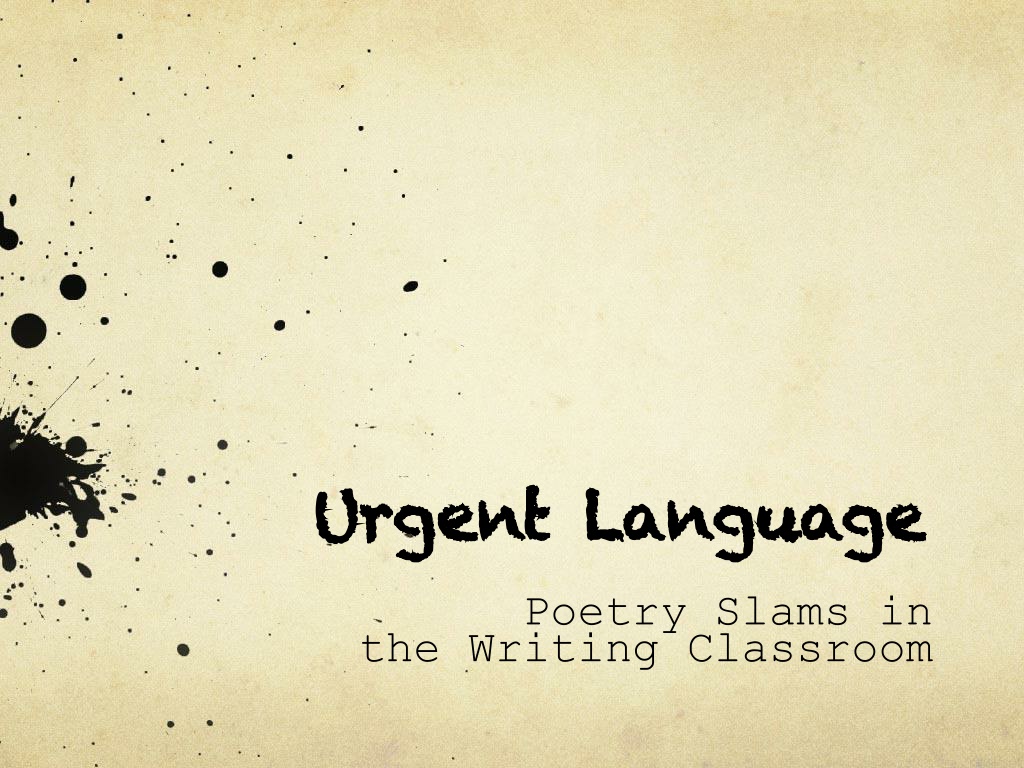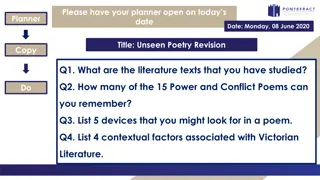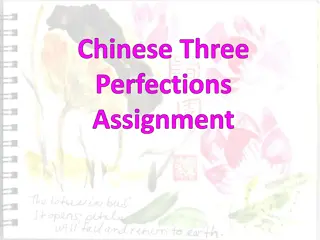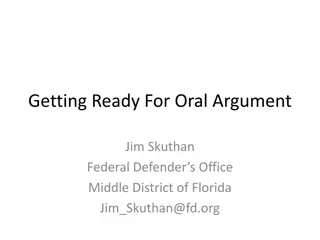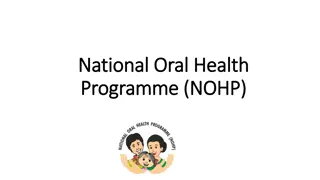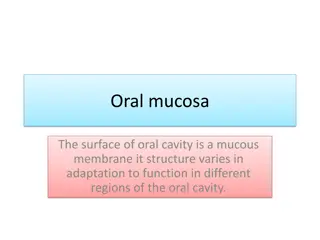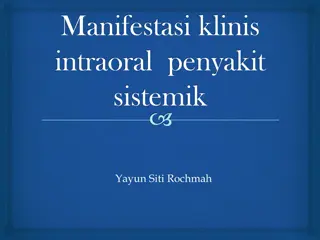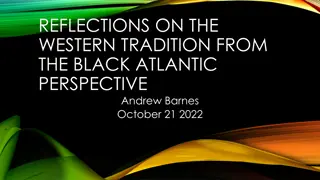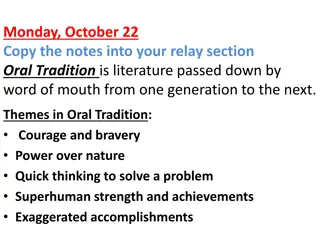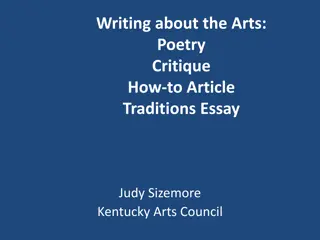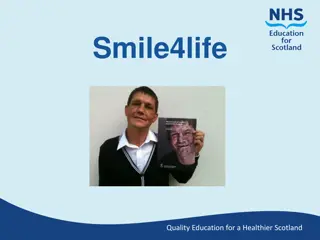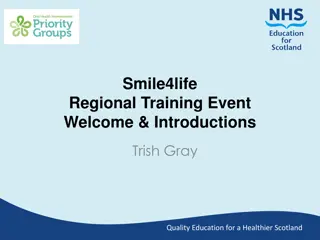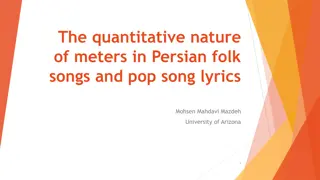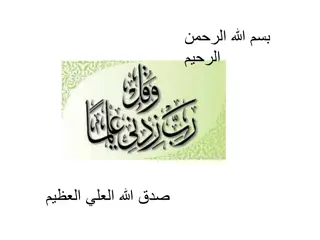Exploring Poetry Slams: A Journey into Oral Tradition
Delve into the world of poetry slams, a vibrant space where spoken-word poets express emotions, share insights, and celebrate the oral tradition of poetic performance. Discover different poetic styles like the Personal Poem, Visionary Poem, Formalist Poem, and Spoken-Word Poem, each offering a unique perspective on human experiences and creativity. Explore the rich history of the oral tradition in English, from medieval folk songs to modern Slam Poetry movements, keeping alive the art of storytelling through spoken word.
Download Presentation

Please find below an Image/Link to download the presentation.
The content on the website is provided AS IS for your information and personal use only. It may not be sold, licensed, or shared on other websites without obtaining consent from the author. Download presentation by click this link. If you encounter any issues during the download, it is possible that the publisher has removed the file from their server.
E N D
Presentation Transcript
Urgent Language Urgent Language Poetry Slams in the Writing Classroom
A Poetry Taxonomy The Personal Poem (The Moaner) I -centered; realistic, everyday settings; often explores relationships & emotional disorders of various kinds; may be confessional; may be narrative. Desire to ex-press, but may also be inward-looking. The Visionary Poem (The Mad Seer or Visionary) Poet as divinator; person with special insight or vision into what others can t see; able to tap faculties of the psyche which are not conscious or rational. Poetry as rare and extraordinary experience. The Formalist Poem (The Maker or Craftsperson) Poet as shaper of language; brings order to the chaos of language; sculpts words into beautiful, enduring objects for our contemplation. May write exclusively in traditional verse forms. The Spoken-Word Poem (The Wandering Minstrel; Bard) Poet as one of the people; the public singer who brings poetry to the fields and streets; poet of the community; tends to be outward-looking. Poetry as sound.
The sound of the belchd words of my voice, words loosd to the eddies of the wind In all people I see myself none more, and not one a barleycorn less A call in the midst of the crowd; My own voice, orotund, sweeping, and final. Spoken Word Poetry The Oral Tradition My voice goes after what my eyes cannot reach; With the twirl of my tongue I encompass worlds, and volumes of worlds. I am the mate and companion of people, all just as immortal and fathomless as myself
The oral tradition in English is really old, but still alive: Homer 600 BC Old English poetry 700-1066 The Beats 1950s Slam Poetry 1980s to present Ongoing efforts to keep the oral tradition alive Hey, Daddy-o Medieval folk songs Serbo-Croatian guslars African talking drums Epic of Gilgamesh Sumer 200 BC
The Bard writes in the spoken-word or oral mode. This poet is the public wordsmith, the troubadour, the performer who takes poetry to the streets. The spoken-word poem is meant to be heard (as opposed to read on the page), and may sometimes include elements of theater and/or musical performance, or even stand-up comedy. The term bard is defined in the Oxford English Dictionary as the early versifying minstrels or poets of other nations , and originated from ancient Celtic orders of poets whose duties were to think of and perform spoken word poems (Bard n.1).
And then there were slams. Another SUB-SET of the spoken-word mode is the slam mode. The slam poem came about in the 1980s in a coffee house in Chicago and was meant to free poetry from the classroom and re-energize it. It tends to be performed in rowdy contests and continues to this day at local and national levels.
How do poetry slams work? Poetryslam.com A Brief Guide to Poetry Slams
Check out these sites to learn about slams! www.nuyorican.org/ AND www.poetryslam.com/
Characteristics of this tradition and mode? Expansive Inclusive Lends itself to PROJECTION; that is, to being spoken loudly on a stage or outside or in a large group May be theatrical Communal; tends to celebrate the community, the whole, or public concerns And of course IT S FLIPPING FUN AND CAN SOUND REALLY GOOD.
1. Blurring the line between poetry and theater; performances are like one-person, one-act plays. 2. Aggressive, clever, sometimes funny rhyme, not in any strict pattern (triple rhymes, internal rhymes, slant rhymes, repeated words, etc. In video, Lazarus, Lazie, Lazy ). 3. Projection! Loud broadcast. 4. Number of unstressed syllables don t matter, maybe. Success depends on how cleverly you get the four stresses in (rap). 5. Getting into a groove. 6. Memorizing the material adds interest and cred. 7. Mixing genres: insert singing, use accompanying sound, etc. 8. Ritual presence of performer.
benefits in the writing classroom
Provides opportunities to explore the physicality of language; language as sensory experience. The body in the classroom. A unit on this can include easily found ads which exploit literary devices in the attention ground wars Can also include readily available political speeches, slogans, sound bites, etc. Compelling ( engaging to most students) and provocative (enables energetic discussion). May turn students on to literature. A multi-cultural urban phenomenon. Entryway to discussions of diversity.
and good for possible discussions of Craft Not discussed much in comp studies (to my knowledge), though this may be changing (e.g. Douglas Hess, The Place of Creative Writing in Composition Studies )
Gymnastic Rhyme and Wordplay Energy Hyperbole Metaphor Allusion Pastiche Pathos Anaphora Saul Physicality of language Williams What do you notice? What s the guy doing? YouTube, Amethyst Rocks, 2:11
Kattie Makkai Compelling personal anecdote Strong appeal to pathos Theatrical use of voice and tone Elements of parody Nice example of critical thinking i.e., interrogating social norms, discussions of genderPRETTY! PRETTY! YouTube, Pretty, 2:11
Taylor Mali Parody (mocking his subject makes the subject s rhetoric visible) Personal anecdote Pathos Persona YouTube, How to Write a Political Poem, 3:28
Jeffrey McDaniel Personae; dramatic mode Classification as expository mode Relatively clear and punchy figurative speech Spoken Word Revolution CD, The Foxhole Manifesto, 2:11 (or YouTube, 5:00)
Dylan Garity Personal anecdote Pathos as well as relatively heavy emphasis on logos Good for discussions of rhetorical situation. Compelling and timely social issue| YouTube, Rigged Game, 3:19
Button Poetry Books Viral Rachel Rostad Lily Myers
Common Hazards of the Slam Poem as Mode of Argument Often relies excessively on pathos and personal experience for support Sometimes reduces the complexity of experience to black and white categories Often relies excessively on catharsis as chief effect Preaches to the choir Precludes the relatively quiet and complex acts of intensive reflection and analysis (these acts don t lend themselves to loud theatrics in large public venues)
Hazards as Poetry Doesn t the contest format make it into a game of winners and losers, precisely what a democratic approach to poetry SHOULDN T be? The physical performance can obscure the fact that the poem per se sucks. Banalities, cliches, etc. The performance can overpower attention to words, language. Sometimes quiet, written poems are insanely powerful as well as completely original. The slam, at worst, just promotes yelling and histrionics. It quickly became as conventional as anything else readers doing predictable political material in a predictable voice and style.
Poets who demonstrate closer analysis and intense self-examination LISA LEWIS TONY HOAGLAND
Annotated bib forthcoming! ...maybe.
